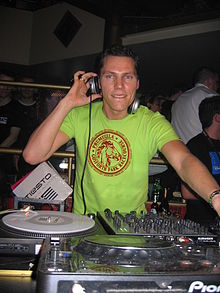In 1997, he founded the label Black Hole Recordings with Arny Bink, where he released the Magik and In Search of Sunrise CD series. Tiësto met producer Dennis Waakop Reijers in 1998, and the two have worked together extensively since then. Reijers is credited as producer, writer, composer, or arranger on many of Tiësto's releases.[9] In 1999 and 2000 Tiësto collaborated with Ferry Corsten to create Gouryella. His 2000 remix of Delerium's "Silence" featuring Sarah McLachlan exposed him to more mainstream audiences. In 2001, he released his first solo album In My Memory which gave him several major hits that launched his career. He ranked in the #1 poll position 3 consecutive times in the DJ Magazine Top 100 Popularity Poll from 2002 to 2004.
Just after releasing his second studio album Just Be in 2004 at the Summer Olympics, he performed live at the opening ceremony in Athens, Greece, becoming the first DJ to play live on stage at an Olympics. Tracks he made especially for the Olympics were mixed together and released as the mix compilation Parade of the Athletes later that year. In April 2007 Tiësto launched both his radio show Tiësto's Club Life on Radio 538 in the Netherlands and released his third studio album Elements of Life. The album reached number one on the Dutch album chart as well on "Billboard Top Electronic Albums" in the U.S. and received a nomination for a Grammy Award in 2008.[10] Tiësto released his fourth studio album Kaleidoscope in October 2009.
As at 2012, Tiësto attained the #3 poll position of the DJ Mag 100 Popularity Poll, and he refers to the styles he mainly plays as House, Electro House, and Progressive House.[11] He plays a new balanced sound sometimes demonstrating lesser known genres such as Dubstep.[12] For nostalgia, Tiësto still throws in the odd Trance House record, the style he became attached to in the early 2000s.[13]
Early life and career
Tijs Michiel Verwest was born in Breda, North Brabant, Netherlands on January 17, 1969.[14] It was at The Spock, a small club in Breda, where he was able to fine-tune his own style by playing in a separate room from 10 p.m. until 4 a.m. on weekends. In the beginning of his career, as a DJ he played mostly New Beat and House music.In 1994, he began releasing material on Noculan Records' sub-labels Chemo and Coolman. During these years, he produced hardcore/gabber tracks under aliases such as Da Joker and DJ Limited. He was later discovered by the general manager of Rotterdam-based Basic Beat Recordings.[15] In late 1994, he signed to Basic Beat where he met Arny Bink, Tiësto released records on the sub-label Trashcan, founded by Arny, and later created the Guardian Angel sub-label with Arny in which they introduced the popular Forbidden Paradise series. Meanwhile from 1995 to 1996 he released four extended plays on Bonzai Jumps and XTC, sub-labels of Lightning Records. In 1997, Tiësto joined his friend Yves Vandichel on his sub-label, DJ Yves, a division of the now defunct Human Resource label XSV Music. In the fall of 1997, both Arny and Tiësto decided to leave Basic Beat and create their own parent label, now known as Black Hole Recordings, Trashcan was discontinued and Guardian Angel continued releasing music until 2002. Through Black Hole, Tiësto released the Magik series and also created two major sub-labels in 1998; In Trance We Trust and SongBird.
From 1998 to 1999, Tiësto released music on Planetary Consciousness where he met A&R Hardy Heller and invited him to release some records on Black Hole. Tiësto later included the In Search of Sunrise series on SongBird. In 1999, Tiësto joined forces with fellow Dutch deejay Ferry Corsten to create the trance based duo of Gouryella.[16] He also collaborated with Benno de Goeij from 1998 to 2000 under the name Kamaya Painters. Since November 1999, he performed monthly as a resident at Gatecrasher in Sheffield, one of the most popular clubs in England. In 1999 he also played in a 12-hour set, being his longest lasting concert in Amsterdam.[17]
Late in 2000, Tiësto decided to concentrate on his personal work and left Corsten by himself to write and produce Gouryella's next single with John Ewbank, the record company was demanding more tracks and neither Tiësto or Ferry could work together at the time.[16] Tiësto introduced Armin van Buuren, Johan Gielen and Ferry Corsten to the mainstream with his first compilations and the In Trance We Trust series. Summerbreeze became Tiësto's debut DJ mix album in the US with the help of a contract signed to Nettwerk.[15] Summerbreeze featured his remix of Delerium's "Silence", which spent four weeks in the UK's Top Ten chart and reached number three in the Billboard dance chart.[15] In Search of Sunrise 2 was released in 2000. Tiësto decided to create a sub-label, known as Magik Muzik. The label began releasing Tiësto’s own releases, but it has also released tracks for the Filterheadz, Oliver Lieb, Mark Norman, Mojado, Phynn and Jes Brieden. The label became a trademark that stands for high quality electronic dance music which was due to the release of Tiësto's classic dance anthem "Flight 643" in 2001.[18]

0 comments:
Post a Comment